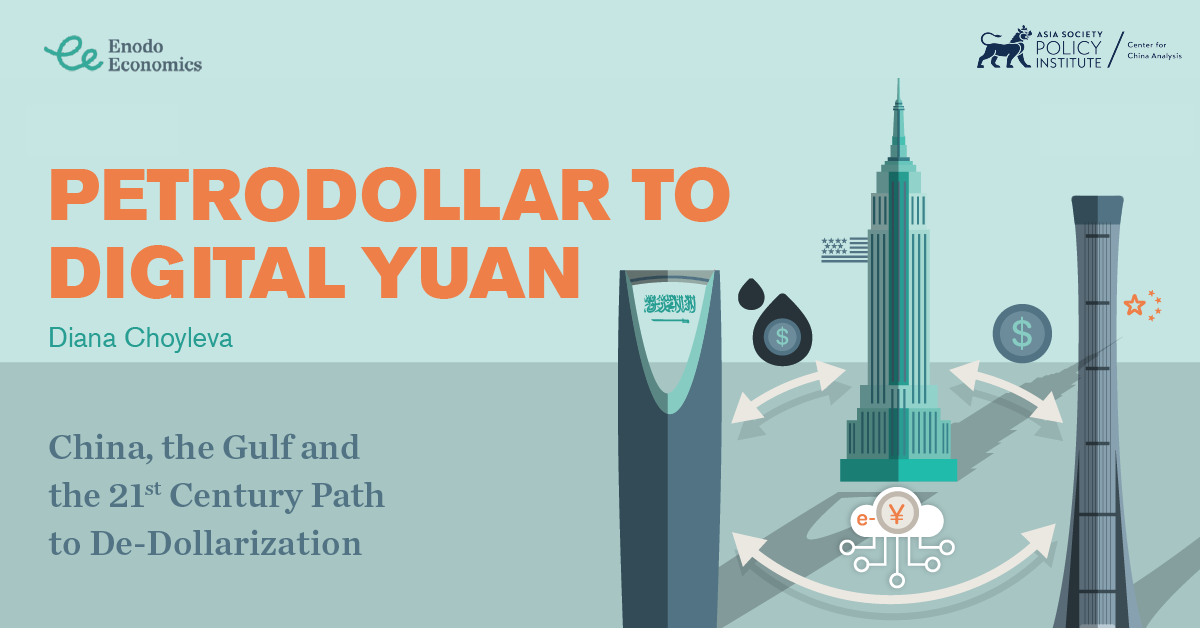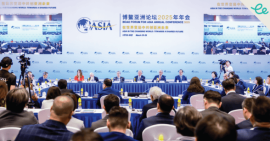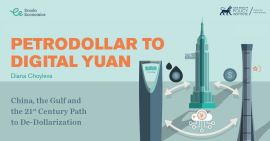How Beijing Plans to Redraw the Global Energy Trade
Special Project
Enodo Economics and The Center for China Analysis at the Asia Society have joined forces on a year-long project to delve into how China intends to elevate the global role of the yuan and challenge the dominance of the dollar by persuading oil producers, notably the Saudi-led Gulf Cooperation Council (GCC), to engage in yuan-based transactions.
Principal Investigator
Diana Choyleva, Chief Economist at Enodo Economics and senior fellow at the Asia Society Policy Institute’s Center for China Analysis, will lead the project.
Project Objectives
We aim to produce a comprehensive report by December 2024, informing policymakers, researchers, and financial communities about China’s strategy, its impact on oil market dynamics, and the potential consequences for the U.S.
Research Focus
Commencing with an exploration of how Beijing plans to ensure oil purchases in yuan through Chinese payment systems, our research will delve into Chinese-language news reports, official speeches, and opinion pieces by government advisors and think-tanks. A parallel focus will be on understanding Saudi Arabia’s goals, evaluating its interdependence with both the U.S. and China. Our analysis will inform scenarios projecting likely developments over the next five years.
Policy Implications
Success in persuading GCC states to de-dollarize oil and gas sales could redirect developing economies towards China, weakening US geopolitical influence.
Advisory Board
Jing Qian
Jing Qian co-founded the Center for China Analysis at the Asia Society Policy Institute alongside Kevin Rudd, whom he served as a senior advisor for almost a decade. As the CCA’s managing director, Jing leads its strategy, research, and policy work on China, which includes coordination of a series of Track 1.5/2 dialogues.
Jing serves as an advisory board member of the Bloomberg New Economy Forum and is also a senior fellow at the Munk School of Global Affairs and Public Policy at the University of Toronto. Jing’s own research is focused on China’s elite politics and its impact on China’s domestic and foreign policy, particularly regarding US-China relations. His analyses have appeared in The Economist, the Wall Street Journal, Harvard Business Review, Nature, and Nature Medicine, amongst other publications.
Nigel Inkster
Nigel Inkster is director of geopolitical and intelligence analysis at Enodo Economics. Prior to that, he spent 31 years in the British Secret Intelligence Service, retiring at the end of 2006 as assistant chief and head of operations and intelligence. Between 2007 and 2017, he worked at the International Institute for Strategic Studies, a leading London security and defence think-tank.
In 2020, he authored “The Great Decoupling: China, America and the Struggle for Technological Supremacy”, a book published by Hurst and described by Professor Rory Medcalf as “a timely, sane and compelling account of the techno-strategic contest that will shape the worlds of 2020s and beyond.” In 2016, he authored “China’s Cyber Power,” an IISS Adelphi book published by Routledge.
Barry Eichengreen
Barry Eichengreen is George C. Pardee & Helen N. Pardee chair and distinguished professor of economics and political science at the University of California, Berkeley, where he has taught since 1987. He is a research associate of the National Bureau of Economic Research (Cambridge, Massachusetts) and research fellow of the Centre for Economic Policy Research (London, England).
In 1997-98, he was senior policy advisor at the International Monetary Fund. He is a fellow of the American Academy of Arts and Sciences (class of 1997). Professor Eichengreen is the convener of the Bellagio Group of academics and economic officials and chair of the academic advisory committee of the Peterson Institute of International Economics. He has held Guggenheim and Fulbright fellowships and has been a fellow of the Center for Advanced Study in the Behavioral Sciences (Palo Alto) and the Institute for Advanced Study (Berlin).
He is a regular monthly columnist for Project Syndicate. His books include The Populist Temptation: Economic Grievance and Political Reaction in the Modern Era (2018), How Global Currencies Work: Past, Present, and Future, with Livia Chitu and Arnaud Mehl, (2017), The Korean Economy: From a Miraculous Past to a Sustainable Future (Harvard East Asian Monographs) with Wonhyuk Lim, Yung Chul Park and Dwight H. Perkins, (2015), Renminbi Internationalization: Achievements, Prospects, and Challenges, co-edited with Masahiro Kawai, (2015), Hall of Mirrors: The Great Depression, The Great Recession, and the Uses-and Misuses-of History, (2015). He was awarded the Economic History Association’s Jonathan R.T. Hughes prize for excellence in teaching in 2002 and the University of California at Berkeley social science division’s distinguished teaching award in 2004. He is also the recipient of a doctor honoris causa from the American University in Paris.
John Raine
John Raine is a senior advisor for geopolitical due diligence at the International Institute for Strategic Studies, a leading London security and defence think-tank.
John joined the UK Foreign and Commonwealth Office in 1984, where he served for 33 years. His overseas postings included Kuwait, Syria, Saudi Arabia, Baghdad and Islamabad. In addition to bilateral and multilateral diplomacy, he worked extensively with the UK armed forces on deployments in Afghanistan and Iraq and, in the UK, on strategy and future capabilities. As a senior member of the national security community, he contributed to the design and implementation of the UK’s defence and security strategy, and managed relationships with a wide range of international security partners.
He is researching current and emergent themes that cross geographic boundaries, namely the use of proxies, the use of non-kinetic force as a means of projecting power, and the potential of alternative approaches to conflict resolution. In addition, he is looking at how an understanding of these themes can help governments, armed forces and multinational businesses to mitigate risk.
Michal Meidan
Michal Meidan is head of China energy research at the Oxford Institute for Energy Studies. Before joining OIES in July 2019, she headed cross-commodity China research at Energy Aspects. Prior to that, she headed China Matters, an independent research consultancy providing analysis on the politics of energy in China. Michal also held senior analytical roles at Eurasia Group in New York and London, and at the Asia Centre-Sciences Po, Paris.
She taught undergraduate courses on China’s political economy at the Hebrew University in Jerusalem and has authored numerous academic articles. Michal also regularly provides comments for a wide variety of media outlets and is featured as a speaker at industry conferences.
Michal holds a PhD in Political Science and East Asian studies from Sciences Po, Paris. She is fluent in Mandarin and French.










Comments are closed.